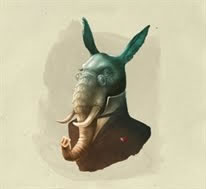Poll: 80% of Americans open to Independent or Third Party candidate for President

According to a new public opinion survey by the Reason Foundation, 80% of Americans and 89% of Independents are willing to consider voting for an Independent or third party candidate for president in 2012.
The detailed Reason-Rupe poll of 1,200 adults, conducted between March 24th and April 9th, finds that a surprisingly high number of Americans are open to Independent and third party alternatives to the Democrats and Republicans. Asked by the polling organization if they would consider voting for an Independent or third party candidate for president in 2012, 60% of respondents answered "yes," an additional 20% said they might consider doing so, and just 17% said they would not. Those who answered affirmatively included 89% of Independents, 83% of Tea Party supporters, 86% of Republicans, and even 71% of Democrats!
If these results are not simply a statistical fluke, they indicate an increasing openness on the part of the American public to consider political alternatives to the Democratic and Republican parties. A WSJ/NBC poll from May 2010 found that 31% of Americans – a record high at the time – agreed with the statement that the two-party system is broken and a third party would be good for the country. A Gallup poll from September 2010 reported that 58% of Americans thought the Democratic and Republican parties do such a poor job of representing the American people that a major third party is necessary.
Though it is rarely addressed publicly by Democrats and Republicans, such discontent has not gone unnoticed among political observers. In a column for The Daily Beast from this past March, Douglas Shoen considered the clear and present desire among the American public for third party and Independent alternatives to the Democrats and Republicans.
“The American people are hungry for a third-party candidate for president, be it a moderate insider or an outsider with a proven record of experience from the business community or the military,” he wrote.
Americans remain deeply dissatisfied with government of, by and for the Republican and Democratic parties. According to the Reason Foundation survey, there are more Americans who do not trust Democrats or Republicans to govern in a responsible manner than there are who trust either party to do so. 35% of respondents said that they do not trust either major party to govern responsibly, including 85% of Independents, 35% of Republicans and 25% of Democrats. Just 30.5% were willing to admit they trust the Democrats and only 23% stated they trust the GOP.
The partisan breakdown of the survey’s respondents roughly corresponds with the aggregate national party identification numbers from Pollster.com, which averages the results from a wide swath of surveys. Among those queried for the Reason poll, 38% were Democrats, 30.5% were Republicans and 24% were Independents. It appears likely, however, that Independents were somewhat under-represented in the survey’s sample. According to Pollster.com, 38.5% of all adults are Independents, 31% are Democrats and 23% are Republicans, while among registered and likely voters 39% are Democrats, 34% are Republican and 28% are Independent.
Prodded by Reason’s polling organization as to whether they are “closer to” the Republican or Democratic party, 41% of Independents stated that they lean toward neither, while 30% stated they are closer to the GOP and 23% said they are closer to the Democrats. Unfortunately, the pollster did not inquire whether self-identified Republicans and Democrats actually lean more toward political independence or a third party such as the Libertarians or Greens than toward the party with which they nominally affiliate themselves.
Ideologically speaking, a plurality of Independents identified themselves as moderates (35%), but they are twice as likely to identify their overall political philosophy as conservative (25%) rather than liberal (12%). Interestingly, comparable numbers of Independents consider themselves to be libertarians (6%) and progressives (6%).
Interestingly, political Independents are also the most likely of any partisan group to state that they belong to no religion. Asked for their religious preference, 24% of Independents stated that they have “no religion,” compared with 17% of Democrats and 9.5% of Republicans. 25% of Independents said that they never attend religious services, compared with 16% of Democrats and 10% of Republicans.
The Reason survey, the first in a series of polls that will be conducted by the organization, provides a detailed look at the views of Americans on everything from the national debt and taxation, to public sector employee pay and benefits, collective bargaining rights, and drug policy. In addition, it queried respondents as to their positions on government involvement in health care, financial services, communications, energy, education and transportation among other things. All of the survey’s findings, including the top-line results and cross-tab report are available in full online.




